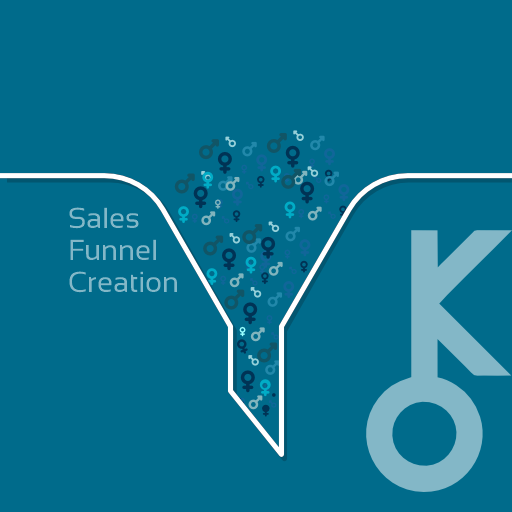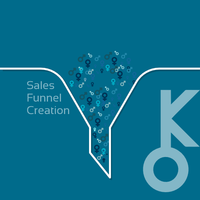Sales Funnel Creation

Sales funnel creation is a crucial process in marketing and sales that aims to convert leads into paying customers. It involves guiding potential customers through a series of steps, nurturing their interest, building trust, and ultimately persuading them to make a purchase or take a desired action.
Importance of Sales Funnel Creation
Creating an effective sales funnel is essential for businesses seeking to maximize conversion rates and revenue generation. By mapping out the customer journey and understanding their needs at each stage, companies can tailor their marketing strategies accordingly. This allows them to engage with prospects effectively, address their concerns or objections, and guide them towards the final purchasing decision.
Stages of the Sales Funnel
Awareness: The first stage is about attracting potential customers' attention. This can be achieved through various marketing methods such as content marketing, social media advertising, SEO optimization, or paid advertisements.
- Example strategies: creating valuable blog posts or videos related to your industry niche; running targeted ad campaigns on social media platforms.
Interest: Once potential customers are aware of your brand or product/service offering, it's important to capture their interest by providing more information about how your solution can solve their pain points.
- Example strategies: offering downloadable resources (ebooks, whitepapers) showcasing expertise; hosting webinars or live demos; implementing lead magnets (free trials/discounts).
Consideration: At this stage, potential customers are evaluating different options before making a purchase decision. They may compare prices, features, testimonials/reviews from other users.
- Example strategies: provide detailed product descriptions/specifications; offer case studies/testimonials highlighting successful implementations; offer comparison charts against competitors.
Intent: In this phase of the sales funnel, prospects have shown clear buying signals indicating they are interested in making a purchase soon.
- Example strategies: sending personalized emails/offers based on their previous interactions; providing limited-time discounts or exclusive offers to create a sense of urgency.
Conversion: The conversion stage is when potential customers become paying customers by completing the desired action or making a purchase.
- Example strategies: implementing smooth and user-friendly checkout processes; offering multiple payment options; providing excellent customer support during the purchase process.
Key Components of a Sales Funnel
Lead Generation:
- Using various marketing channels to attract potential customers and capture their contact information (e.g., email address, phone number) for further engagement.
Lead Nurturing:
- Building relationships with leads over time by delivering valuable content, addressing their concerns, and maintaining consistent communication through channels like email marketing or personalized messaging.
Qualification:
- Separating qualified leads from unqualified ones based on predetermined criteria (demographics, behavior, interest level) to prioritize sales efforts effectively.
Sales Conversion:
- Presenting compelling offers and overcoming objections to encourage prospects to make a purchase decision or take the desired action.
Retention & Upselling:
- Engaging with existing customers after a sale to ensure satisfaction, encourage repeat purchases, and potentially upsell additional products/services.
Tools for Sales Funnel Creation
To streamline the sales funnel creation process, various tools can be utilized:
- Customer Relationship Management (CRM) software: Helps manage customer interactions at each stage of the funnel.
- Email Marketing Platforms: Facilitate effective lead nurturing campaigns through automated drip sequences.
- Landing Page Builders: Allow easy creation and optimization of landing pages for capturing leads.
- Analytics Tools: Provide insights into visitor behavior, conversion rates, and performance metrics across different stages of the funnel.
- A/B Testing Software: Enables testing different elements within your sales funnel to optimize conversions.
Implementing an efficient sales funnel is an iterative process, as it requires continuous monitoring, analyzing data, and making adjustments to improve conversion rates and revenue generation.
Sponsored
Sponsored
Sponsored
Explore More:

The Impact of AI and Machine Learning
As technology continues to advance at a rapid pace, businesses are constantly looking...

Future of Sales Funnels
The future of sales funnels is an exciting and promising concept for businesses...

Lessons Learned from Failed Funnels
In the realm of sales funnel creation, case studies serve as valuable resources...

Successful Sales Funnel Examples
In sales funnel creation, case studies play a crucial role in demonstrating the...

Case Studies in Sales Funnel Creation
In the world of sales and marketing, case studies play a crucial role...

Sales Funnel Recovery Strategies
Sales funnels are a critical component of any successful sales and marketing strategy....

Improving Funnel Efficiency
A sales funnel is a crucial component of any business's marketing strategy. It...

Identifying Funnel Leaks
A sales funnel is a systematic approach to guiding potential customers through a...

Sales Funnel Troubleshooting
Sales funnel troubleshooting is the process of identifying and resolving issues or bottlenecks...

Sales Funnel Tools and Software: Landing Page Builders
Sales funnels are essential in driving conversions and increasing revenue for businesses. To...

Sales Funnel Tools and Software: Email Marketing Tools
Sales funnel tools and software refer to the various technologies and platforms available...

Sales Funnel Tools and Software: CRM Software
Sales funnel tools are software programs or applications designed to help businesses track...

Sales Funnel Tools and Software
A sales funnel is a framework used by businesses to guide potential customers...

Measuring Sales Funnel Performance: Analytics and Reporting
Measuring sales funnel performance analytics and reporting is a crucial aspect of any...

Measuring Sales Funnel Performance: Sales Funnel Metrics
Measuring the performance of your sales funnel is crucial for understanding the effectiveness...

Measuring Sales Funnel Performance: Key Performance Indicators (KPIs)
Measuring the performance of a sales funnel is crucial for any business aiming...